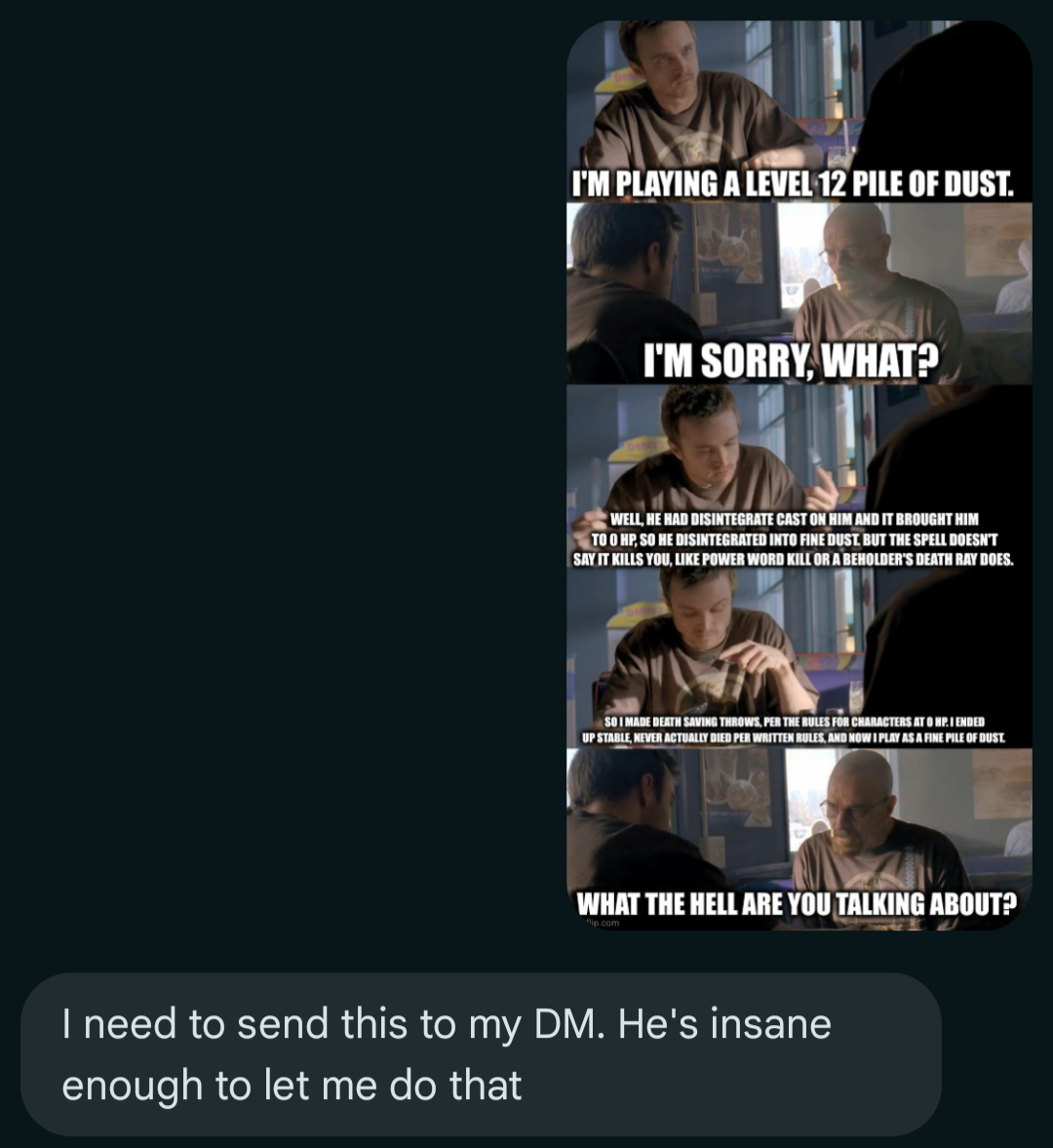Disclaimer: this is purposefully obtuse.
Other effects in the game which explicitly state they kill you:
Shadows, succubi, massive damage, death saving throws, beholder death ray (notably not even their disintegration ray kills you), power word kill, vampires, mind flayers, night hags, drow inquisitors.
Clearly, if they intended for disintegration to kill you, they’d have said so. Since specific overrides general, and there is no general rule that disintegrated creatures are dead, I rest my case. QED.
Ain’t nothin’ in the RAW that states a sentient pile of dust can’t play basketball.
Dustbud ®
All new straight-to-DVD film, “Air coughing fit”
OP you appear to be committed to (not) dying on this hill and I applaud you
I like it RAW and wriggling!
What’s sneezing precious
I’d like to imagine that this is how non-necromantic sapient undead creatures are created, someone has all their flesh incinerated away but somehow their soul clings to the bones, and bam sapient skeleton.
In this case it could result in a poltergeist, which uses the dust to interact with things.
You’re not dead when you’re petrified, either, which can lead to some pretty interesting exploits, rules-as-written.
Petrified creatures count as creatures, not objects, so rules-as-written you can determine if a statue is a petrified creature by trying to target it with a spell that requires a creature for a target.
With the cantrip Poison Spray, you can check for petrified creatures without using spell slots or risking damaging the creature, since it would be immune to poison while petrified.
I hate DMing for players smarter than me 🤬🤗
You can also safely check with Vicious mockery. The spell can target any creature, but only damages the target if it can hear, which “inanimate” things cannot.
On the other hand, Dissonant Whispers causes the target to hear (rather than hearing being a precondition as it is with Vicious Mockery) and with this you can kill petrified creatures, thus ensuring no spell casters return them to flesh-and-blood, without damaging the statue.
This is straight up horrible. LOL, party goes on a mission to obtain a cure for petrification to save a bunch of statues only to discover that they are all a bunch of corpses because the villain is just that big of an asshole.
Hope you brought your diamond dust!
If you want to go absolutely strict RAW with the creature/object distinction, resurrection spells don’t technically work. They target “a creature that died”, which, by an obnoxiously precise reading of the rules, can’t exist. After they die, they’re an object and not a valid target.
I don’t understand why they can’t just make “dead” a state a creature can be in.
A disintegrated creature and everything it is wearing and carrying, except magic items, are reduced to a pile of fine gray dust. The creature can be restored to life only by means of a true resurrection or a wish spell.
Why would you need to be “restored to life” if you weren’t dead?
Because you could later die. So a creature that has been disintegrated, and then later dies, can only be brought back by those means.
If this was the intent of the rules, it would be expressed in explicit, unambiguous language. They don’t write contingency rules for possible future events that haven’t happened this way, and if you interpret rules documents this way, then everything becomes an argument.
The implication of “the creature can only be restored to life by (x)…” is present tense. It applies to the current state of the game following the events described. The language “unattended objects catch fire” in fireball doesn’t mean “unattended objects in the area of a fireball will catch fire if someone sets fire to them.” it means they catch fire.
Language in rules doesn’t ambiguously cater to a potential future state of the game that may not occur. It is describing the current state of the game, like the rules do in all other situations.
To the contrary, if it were intended to kill you it would be explicit. See all the examples I included in the OP.
The “present tense” argument doesn’t hold water when you look at how spells are worded. Let’s take a look at Alarm:
You set an alarm against intrusion…
Present tense. It describes a state change to the game world.
…Until the spell ends,…
Describes an ending to that state. We can conclude that the alarm state lasts until the spell ends.
Disintegration does not describe any such end to the changed state. We can conclude that this rider effect comes into play if the character ever dies in the future.
The “present tense” argument is that “the creature can only be restored to life” describes the current state of the creature. It’s currently possible to restore the creature to life using wish, and therefore they are currently not alive. This is a plain reading of the RAW, and it’s inconsistent with the entire cohort of the rules to claim otherwise.
If that’s not good enough for you, then it’s also the intention of “reduced to a pile of grey dust” is that players will be intelligent enough to know that dust is an object, and not a creature. There’s no statblock for the dust because objects don’t have creature stat blocks.
If THAT’S not good enough for you, it’s the intention of the rules that the players use common sense when reading them.
If THAT’S not good enough for you, Crawford has explicitly stated that if disintegrate reduces you to 0hp, you’re killed - and he wrote the rule.

Any of these four arguments should be enough for a DM to be able to make a sensible ruling here, although normally I don’t rely on an appeal-to-Crawford for rulings.
If you want to play a slapstick comedy style campaign where your DM allows things to happen outside of RAW because they’re silly or fun or whatever - there’s nothing stopping you. The joy of DnD is you can play the game however you like, so long as your group are happy with that.
Edited, because you edited your comment as I was replying: The “current state” of the creature is that it can only be brought back to life by the means mentioned in the spell, I agree with you there. But it does not mean that the creature need be dead for that to be a true statement about its state.
Would you agree with me that the normal, default state of a creature is “can only be brought back to life by [exhaustive list of all reviving magic]”?
Nothing says you become an object. Compare to True Polymorph, which has a section for turning a creature into an object.
It’s assumed that the player is clever enough to know that dust is an object, as the player’s brain is assumed to not be made of dust.
I’m not looking for assumptions, I’m looking for RAW. I don’t know about you but at my table we play by the rules.
I thought you needed a body part to resurrect? I might be thinking Pathfinder, though cause I mostly play that.
The dust is your body, just in a different shape
But… how do you kill that which has no life?
It’s DND, usually a good thwacking or else some holy damage.
You’re misreading the language. It is present-tense, not future.
I’m not misreading anything. “The creature can only…” applies a new state to the creature. After that state has been applied, or somehow reversed (unaware of any way to do this by RAW), then the creature can only be brought back to life by the means mentioned in the spell.
Yes you are. You’re intentionally abusing a weakness in English language (present and future tense are often written the same way so must be inferred by context) to assume something clearly not intended by the 2 sentences considered holistically.
It’s a funny joke. +1, but, ain’t no DM takin dis Hail Mary from a player seriously. 😂
ain’t no DM takin dis Hail Mary from a player seriously
I absolutely would, my players would need to be creative to allow this dust pile to communicate and do anything, but I’m quite sure they could manage
New villain is a cleaner with a feather duster +1.
I was legit imaging a pile of dust that learns telepathy to communicate with their party members and screams in an angry scotch accent to be thrown at their enemies so that their particles might sting the bastards eyes and blind them
They’d be deathly afraid of any and all cleaning staff, but also the party would have a broom and catch pan of some sort for when their buddy get a lil spilt
use whatever spell that lets you somehow communicate with it, somehow enable it to cast spells on its own (i would presume if there’s still a mind it can simply cast spells?), then it’s just a weird magical creature similar to elementals and slimes from then on.
Just playing the game RAW.
It’s like this for all TTRPGs. Someone always be tryin to game the system. 😎
It’s like this for all TTRPGs. Someone always be trying to rules lawyer away someone’s fun. 😎
I’m sorry, I don’t know enough about the English language to recognise the difference. What would the phrase be in future tense?
No. He’s trolling you. No Reasonable person thinks this.
If the creature dies it can be restored to life only by means of…
The difficulty of restoring to life someone who is already alive is why such high-level magic is required.
My sister played a campaign as a sentient ham sandwich. She would love this.
Edit:

Lmao 🤣
Haha awesome, glad she enjoyed it!
I’ve never played DND so I don’t know if this is something you could pull off or anything but I’d probably be like
“I snort the fine pile of dust” and then, I don’t know, there’s some latent personality or intention there, so now we have to alternate playing my character between turns/minutes or something. It’d probably make for some great RP moments, especially if each personality couldn’t remember very well what the other was doing previously. Maybe the class and abilities change with each person, which makes arming up appropriately interesting or a pain depending on how we handle it I suppose.
I’d say ingesting the powder either kills it (had the players managed to get me to agree it was alive) or sends it on a tour of your digestive tract
That would definitely fit right in at our table. Half the group is trying to break the game with their build, and the other half is trying to one-up the first half.
The spell specifies you turn into gray dust. Unfortunately gray dust has no listed stat block.
Luckily it is mentioned in “Tales from the Yawning Portal”, “The floor of this room is covered with a layer of fine gray dust and ash, three inches deep.”
Based on the rest of the description you are restricted to the room in which you turned to dust and the only action you may take is casting " Minor Illusion", with the added restriction of all illusions must be humanoid.
Nothing about the Disintegration spell says that your stats change. Compare to spells that do, such as Polymorph, or True Polymorph which even covers changing a creature into an object.
I’m not changing your stats, you still have a 14 wisdom.
You are however definitely turned into gray dust and I’m applying the rules as written about gray dust. The gray dust is restricted to the current room and can only form the shapes of various humanoids.
Disintegrate also specifies the creature can only be brought back to life with a true resurrection or wish spell. Which most certainly means it is indeed dead, otherwise, why mention bringing it back to life?
That’s probably the path I’d take as a DM if I had a player insisting on rules lawyering like OP. OK, you get to “play” as a pile of dust. Have fun sitting there until random wind currents blow you around.
Crappy party mates you have if they won’t even scoop you up into a bag and carry you around.
buddy let’s start a campaign together you can be the pocket sand and i will be dale gribble
Hachacha!
If a guy is doing what you’re doing in this thread at the table, then yeah, I’d support them in leaving you there.
Doing what? Trying to play by the rules? It’s a game! Games have rules. If you can’t accept someone living out their pile of dust fantasy, which is clearly supported by the rules, then I think you need to take a long look in the mirror and ask yourself who hurt you.
*ahem Subtle Spell has entered the chat. Cast any spell that doesn’t require a line of sight target and that doesn’t require material components or otherwise rely on an “attack” or similar action. Like say Guardian Of Nature. Or, if you want to get REALLY pedantic: Dimension Door.
The rules also don’t state that being incapacitated impairs movement in any way, dropping to 0hp is stated to incapacitate you. So you can just move away at 0hp.
Obviously we have DMs who aren’t robots and will play to the spirit of the game, not the word of the rules.
No, dropping to 0 hit points makes you unconscious, not incapacitated. That’s an important distinction. It’s the unconscious part that impairs your movement.
The rules state that you either die or fall unconscious when you have 0 hit points. The definition of “unconscious” in Appendix A specifies that you are incapacitated AND can’t move or speak AND are unaware of your surroundings.
EDIT: Maybe I shouldn’t assume you’re talking about 5e. I have no idea about 5.5e or any other edition
Yes but in D&D you only quote the rules that support whatever bullshit you’re trying to pull.
Do they need to define dictionary words? You are incapacitated, you don’t have capacity to do that.
The lack of qualification indicates you are completely incapacitated and have no capacity to do or say anything.
I see no flaw in this argument. Instead of dying, the character exists like the guy from “One” by Metallica, desperately waiting for a stiff breeze to end his existence.
Dust pan, imprisoning me, all I can be, a pile of fine dust
I cannot live, I cannot die, turned into dust, scattered across the floor
Why would it matter if it says you die? It’s not like there’s a rule that dead characters can’t take actions. Or that they transform into objects. Or get sent to another plane of existence depending on who they worship and their alignment while leaving an object behind.
Because if it doesn’t say I’m dead, I’m not dead. QED.
Probably should go join the Thousand
SunsSons. They might set you up with some nice power armor.Thousand Sons*
Also, pretty sure that it comes with a permanent controlling enchantment subjugating them to the next Sorcerer
If the speck of dust is sentient, then it’s not really a rubricae. The suits of armor do nothing when not controlled
that’s a lich that travels with his phylactery
I like it!
Fine dust does not have the consistency of chunky salsa, so it checks out.
This is the real meaning of the exception that proves the rule.
AI GM be like: “Yep. Seems legit.”














